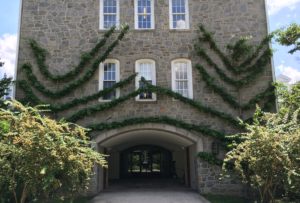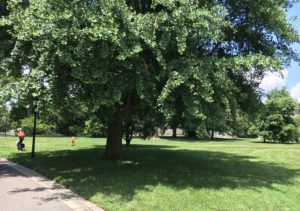Hello fellow readers,
I recently attended the Woody Plant Conference at The Scott Arboretum in Swarthmore, PA. We learned about new plants and the dozen or more years it takes from propagation before they become available to buy. Plant patents, once rare, are now commonplace. Then there’s a plant that has its own ‘brand,’ so to speak, that dates back to the age of the dinosaur.
Peter Crane, formerly the Director of the Kew, The Royal Botanic Gardens in London, spoke about his book Ginkgo: The Tree that Time Forgot. It’s a fascinating biography of a tree that hasn’t changed much in 200 million years. Most likely due to environmental change, Crane explained, ginkgo was ‘in retreat and survived only in China.’ But when its health benefits became known, it ‘was brought back from the brink of extinction about a thousand years ago.
The nuts are a delicacy in Asian cultures, and we use extracts from the leaves as a supplement to sharpen the mind. You can read about a host of conditions that ginkgo is said to help, such as memory loss, dizziness, ringing in the ears, hearing disorders, and even leg pain associated with poor circulation.
With its extraordinary endurance, ginkgo has become a symbol of longevity, health, and wellness. It can withstand pollution and live in narrow spaces commonly seen on city streets. They’re often commemorative trees, such as in Hoboken, NJ, across from where the World Trade Center once stood.
Crane pictorially described the iconic fan-shaped leaves that turn lemon yellow and drop almost all simultaneously, leaving a carpet of gold in the fall, which adds to its ‘horticultural prominence.’
This remarkable tree has an unusual reproductive system. No other tree has the process of fertilization that involves the production of swimming male cells, explained Crane. And male trees are most widely planted as the female trees produce an apricot-looking fruit that smells like a combination of dog feces and vomit. But don’t hold that against them. Ginkgo biloba is one of the longest-living tree species in the world. The oldest one on record lived 3,500 years.
Peter Crane so eloquently writes, ‘The evolutionary and cultural life story of ginkgo connects us to the deep history of our planet and asks us to reflect more often and think more carefully about all we lose when the short view rules our world and everything in it.’ Powerful wisdom we can learn from a tree.
Garden Dilemmas? askmarystone@gmail.com




